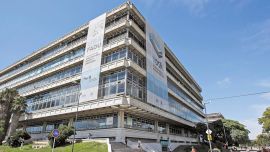Vice-President Cristina Fernández de Kirchner on Friday took up her own defence in court during a corruption trial, slamming the “lies, slander and defamation” she alleges she has faced.
Joining her legal team to deliver closing arguments in the so-called ‘Vialidad’ trial, which is probing alleged graft in the awarding of public works projects in her home province of Santa Cruz, the former president accused prosecutors of lying in a case she attributes to political and judicial persecution.
Referencing the assassination attempt on her life earlier this month, Fernández de Kirchner accused the Judiciary of lending credibility to the claims against her and of fostering a climate in which the shock attack could take place.
"Until September 1, I thought that this [the trial] was to stigmatise me and Peronism, to proscribe me. But after September 1, I realised that there could be something else," said the vice-president, referring to the attack from which he emerged unscathed.
The attacker and three others linked to him have been arrested so far. But the vice-president, who referred to the group as the "gang of perpetrators," declared "that no-one can think that this gang devised and planned this attack."
Prosecutors Diego Luciani and Prosecutor Sergio Mola have asked the judge overseeing the case to sentence Fernández de Kirchner to 12 years in prison for the alleged crimes of illicit association and fraudulent association, as well as hand her a lifetime ban from holding political office.
"We are facing a clear case of malfeasance. Prosecutor Luciani and prosecutor Mola lied in the prosecutor's indictment. It is a trial full of lies, slander and defamation," Fernández de Kirchner, addressing the court remotely via videoconference from her office in the Senate.
The vice-president protested that the court had refused in August to grant her an extension of an earlier statement, which she requested after prosecutors had made their case, incorporating, she alleged, new elements into the case.
The former president, who led Argentina between 2007 and 2015 as head of state, also stressed that her intervention on Friday "is not a gracious concession from the court" but a prerogative given to her by the fact that she is a lawyer by profession.
"If I had not been lucky enough to be a lawyer, I would have been defenceless in the face of the prosecutor's expanded plea," charged the former president, who survived an assassination attempt on her life earlier this month.
Allegations
Fernández de Kirchner, 69, stands accused of forming an illicit association and aggravated fraudulent administration related to alleged irregularities in the awarding of public works projects in her home province of Santa Cruz during her 2007-2015 time in office.
Along with a number of former government officials, she is accused of directing contracts worth hundreds of billions of pesos to businessman Lázaro Báez as part of a corruption ring.
She denies the claims against her and says they are part of a bid to tarnish her political legacy and future. Fernández de Kirchner has been acquitted in several cases for alleged crimes that occurred when she was president, but she still faces five trials in the courts.
A verdict in the case, which can be appealed, is expected later this year. Fernández de Kirchner enjoys parliamentary privileges that exempt her from arrest or disqualification until the Supreme Court issues a final judgement against her.
On September 1, the vice-president emerged unscathed from a failed shooting attempt on her life. The assailant approached her with a handgun from a crowd of supporters gathered outside her residence in the Recoleta neighbourhood of Buenos Aires, pulled the trigger twice but failed to fire.
In her address to the court, the vice-president recalled a stone-throwing attack on her congressional office in the Senate last year and the recent assassination attempt.
"Until September 1, I thought that they were stigmatising me, outlawing me, defaming me, slandering me," she said. "But then I realised that there might be something else behind all this, because suddenly it is as if the judicial sphere is giving social licence for anyone to think and do anything."
"They tried to kill me by firing a gun 15 centimetres from my face," insisted the former head of state, who also recalled that posters had appeared across Argentina showing her face and the words ‘Murderer.’
In closing her defence, the head of the Senate said: "Argentina does not get by well with this justice system, with this judiciary and with this kind of stigmatisation."
‘Arbitrariness’
Seeking to refute the allegations on Friday, the vice-president questioned the “arbitrariness” of the case against her and said she felt like she was “living a movie with those trials in which the truth is sought.”
"The reality of what happened does not stand up to this accusation, but nevertheless it was carried forward," she complained.
Referencing to her eight-year presidendency and the preceding term of her late husband, former president Néstor Kirchner, the vice-president said “we were elected by the people, so we can never be an illicit association," adding that the public works projects cited in the case were carried out with oversight from the Santa Cruz provincial government and had already been assessed by judicial authorities in the Patagonian province.
The accusation of illicit association "has neither head nor tail, but fundamentally it is deeply unconstitutional, deeply anti-republican and deeply anti-federal" sentiment, said Fernández de Kirchner.
She added: "They had to bring me to court by the hair and for that they brought the Constitution, the Criminal Code, the Civil Code, jurisprudence, everything by the hair. I want it [the case] to be understood, because it is really nonsense. This does not help, this complicates a country, it makes it unserious, almost on the verge of ridicule."
– TIMES/AFP/NA























Comments